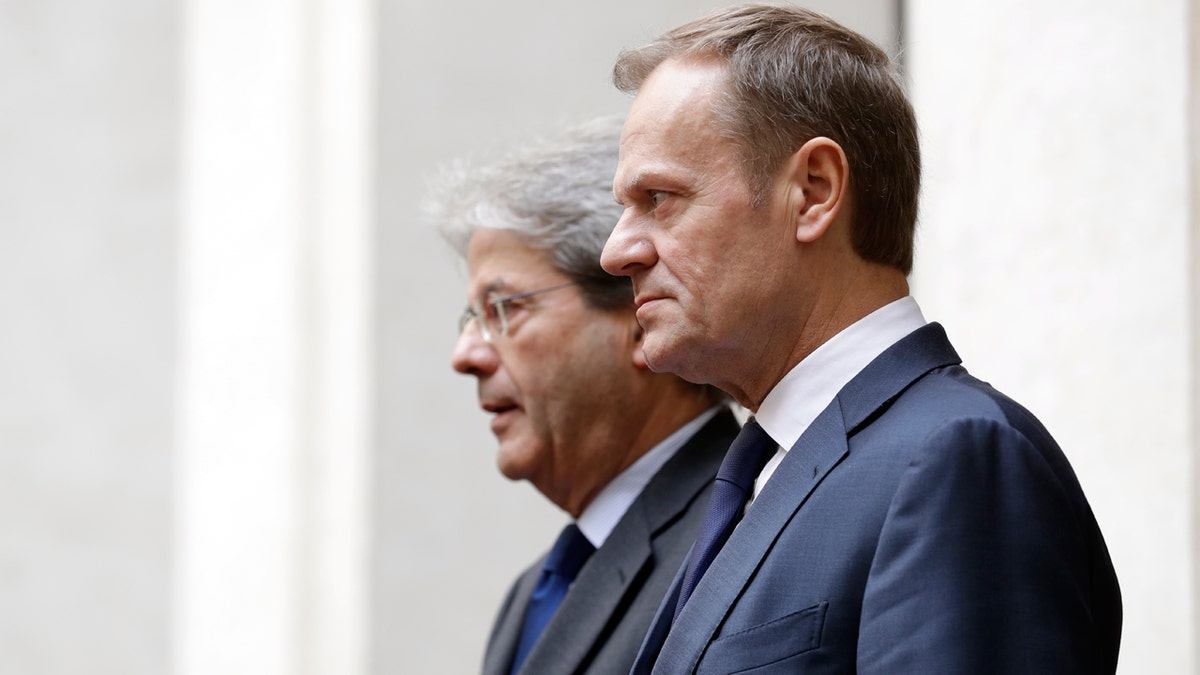
Feb. 1, 2017: Italian Premier Paolo Gentiloni, left, and European Council President Donald Tusk review the honor guard at Chigi Palace's Premier office in Rome. (AP Photo/Andrew Medichin)
It’s one thing to watch Chuck Schumer manufacture tears for immigrants, or Nancy Pelosi critique a nominee for the Supreme Court, for whom she is not entitled to vote. They are at least Americans, and entitled to voice their discontent with Donald Trump’s nascent administration.
It’s another matter for the European Union – the most dysfunctional political and economic Rubik’s Cube ever devised – to launch a frontal assault on its traditional across-the-waters ally, and, by the way, its main guarantor of military protection.
Yet that’s exactly what has happened in this frantic first fortnight of Trump-land. In a piece of political showmanship on a par with Baghdad Bob (remember him?), the president of the E.U. has equated the Trump administration with China, Russia and radical Islamic terror as a threat to the security of Europe.
The letter of alarm came from Donald Tusk, a former prime minister of Poland who has led the 28- (soon to be 27) nation club since 2014. In it, he listed various existential dangers to the continent: China’s assertiveness in the South China Sea, Russia’s expansionist actions in Ukraine, and the continuing threat of Islamic terror.
Then came the sucker punch: “Particularly the change in Washington puts the European Union in a difficult situation; with the new administration seeming to put into question the last 70 years of American foreign policy.”
He’s right. Trump has – in typically blunt fashion – said that European countries, long protected by NATO, have to pay their fair share for their own defense, or risk NATO becoming obsolete. In other words, the free ride is over.
Tusk’s out-of-nowhere attack may be less about Trump than Teresa May, the British prime minister and current Typhoid Mary of Europe. The United Kingdom’s vote last year to leave the E.U. – now famously known as Brexit – was and remains an unforgiveable affront to the bureaucratic spider’s web that the E.U. has become.
When May visited Washington last week, she and Trump spoke of renewing the “special relationship” that the U.K. and the U.S. have traditionally enjoyed -- salt in the wound inflicted by the Brexit vote. And Tusk, who has to keep his member states in line lest another one threaten to pull out, is taking a chance of alienating the United States as a way of asserting E.U. influence.
Tellingly, Tusk had his January 31 letter delivered to 27 E.U. member states – but not to the United Kingdom. In it, he implored his neighbors: “Let us show our European pride. If we pretend we cannot hear the words and we do not notice the decisions aimed against the E.U. and our future, people will stop treating Europe as their wider homeland.”
Exactly, Mr. Tusk. Exactly. Check the bellwether of public opinion.








































